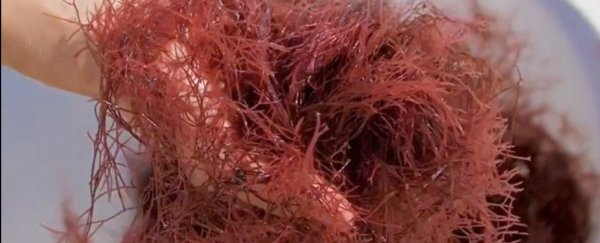A vibrant pinkish-coloured seaweed that grows in temperate tropical waters could end up being a huge aid in reducing greenhouse gases, if scientists in Australia have their way.
Researchers are currently looking into ways to sustainably mass-produce the crimson-hued algae – called Asparagopsis taxiformis – after a study five years ago demonstrated it almost completely nullified the natural release of methane burped out by cows.
"When added to cow feed at less than two percent of the dry matter, this particular seaweed completely knocks out methane production," says aquaculture biologist Nick Paul from the University of the Sunshine Coast.
"It contains chemicals that reduce the microbes in the cows' stomachs that cause them to burp when they eat grass."
Paul was a member of an Australian research team who in 2014 analysed 20 different species of tropical macroalgae to see which, if any, might best reduce methane production when fed to cattle.
Of the candidates tested, A. taxiformis was the most effective, inhibiting 98.9 percent of the animals' methane production after 72 hours.
While methane represents a much smaller overall source of atmospheric pollution than carbon dioxide (CO2), its heat-trapping potential makes it much more harmful than CO2, especially in the short term.
Over the course of 100 years, atmospheric methane is about 28 times more effective at trapping heat than CO2, and in a 20-year time-frame it's thought to be over 100 times worse.
With that kind of heat-trapping potential – and the reality that livestock are responsible for about 14.5 percent of all anthropogenic greenhouse gas emissions (65 percent of which are due to cattle) – it's clear that A. taxiformis could have a vital role to play in reducing future global warming.

The challenge, then, is figuring how to ramp up production and growth of the seaweed – ensuring the algae, or a chemical extraction from it, ends up in cow feed across Australia, and in the long run, internationally.
"This seaweed has caused a lot of global interest and people around the world are working to make sure the cows are healthy, the beef and the milk are good quality," Paul says.
"That's all happening right now. But the one missing step, the big thing that is going to make sure this works at a global scale, is to make sure we can produce the seaweed sustainably."
To that end, Paul and his team are looking at ways of finding the optimal growing conditions for the algae, studying their growth in large outdoor aquaculture tanks, while also investigating ways to maximise the concentration of the seaweed's active chemical compounds.
One of the difficulties is discovering how to make an alga – even one that grows prolifically along the Queensland coast – become something akin to a farm crop that can be harvested in other kinds of environments.
"The conundrum we have is that this is not a particularly abundant species and we can't just harvest it from the sea," Paul told The Age.
"So as we have these wonderful discoveries we're trying to find a way to actually farm it, and produce enough to have the environmental impact we're seeking."
